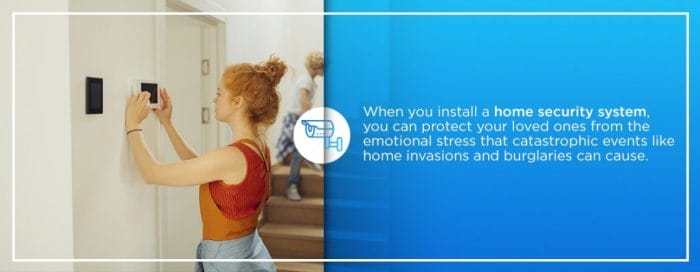In today’s uncertain world, safeguarding our homes and possessions has become paramount. Insurance companies, with their expertise in risk assessment and prevention, offer invaluable insights into securing your home and ensuring peace of mind. From physical security measures to smart home technology, we’ll delve into practical tips and strategies to protect your property and loved ones.
Home security is not just about preventing break-ins and theft; it’s about creating a secure environment that fosters a sense of well-being and comfort. By working with insurance companies and implementing their recommendations, homeowners can proactively mitigate risks, minimize losses, and enjoy a safer living space.
Home Security Tips from Insurance Companies
In today’s world, safeguarding our homes and belongings from potential threats is of utmost importance. Insurance companies play a crucial role in providing valuable tips and insights to help homeowners enhance their security measures. By implementing these recommendations, homeowners can reduce the risk of break-ins, property damage, and other security breaches, thereby ensuring a safer and more secure living environment.
Insurance companies offer comprehensive security tips that address various aspects of home protection. These tips are based on extensive research, data analysis, and insights gained from real-life claims experiences. By leveraging this knowledge, homeowners can make informed decisions about security upgrades, risk mitigation strategies, and preventive measures to safeguard their homes and families.
Adopting a Layered Security Approach
A layered security approach involves implementing multiple layers of protection to deter potential intruders and enhance overall home security. This includes physical barriers, electronic surveillance systems, and security protocols. By combining different security measures, homeowners can create a comprehensive defense system that makes it more challenging for burglars to gain access to their property.
- Physical Barriers: Installing sturdy doors, windows, and locks can act as a deterrent to potential intruders. Consider installing deadbolts, security bars, and window locks to reinforce entry points.
- Electronic Surveillance Systems: Implementing security cameras, motion sensors, and alarm systems can provide real-time monitoring and alerts in case of suspicious activity. These systems can be integrated with mobile devices, allowing homeowners to monitor their property remotely.
- Security Protocols: Establishing security protocols and routines can help prevent accidental breaches. This includes practices such as locking doors and windows when leaving the house, being cautious about sharing keys, and implementing a home security checklist before going on vacation.
Common Home Security Risks

Home security risks are a significant concern for homeowners, posing potential financial losses and emotional distress. These risks can arise from various sources, such as burglary, theft, property damage, and natural disasters.
Burglary and theft are common home security risks that can result in the loss of valuable possessions, leading to financial setbacks and a sense of vulnerability. Property damage caused by vandalism, accidents, or natural disasters can also incur significant repair costs and emotional distress.
Burglary and Theft
Burglary and theft are prevalent home security risks that pose a direct threat to homeowners’ possessions and sense of security. Burglars often target homes that appear unoccupied or lack visible security measures, making it crucial to implement preventive measures such as installing security systems, securing doors and windows, and maintaining a well-lit exterior.
Property Damage
Property damage can occur due to various causes, including vandalism, accidents, and natural disasters. Vandalism can result in costly repairs and emotional distress, while accidents like fires or water leaks can cause extensive damage to the home and its contents.
Natural disasters such as storms, floods, or earthquakes can also inflict significant property damage, potentially leading to financial losses and displacement from the home.
Insurance Companies’ Expertise

Insurance companies hold a wealth of knowledge and resources in evaluating home security risks and offering tailored advice to enhance protection. Their expertise stems from years of experience in assessing claims related to home security breaches, enabling them to identify common vulnerabilities and effective security measures.
Working closely with insurance companies can significantly improve home security. They provide valuable insights into the latest security technologies, trends in home security breaches, and specific vulnerabilities associated with different types of properties.
Risk Assessment and Tailored Advice
Insurance companies conduct comprehensive risk assessments to identify potential vulnerabilities in your home’s security system. They consider factors such as the property’s location, surrounding environment, construction type, and previous claims history. Based on this assessment, they provide personalized recommendations to address specific risks and enhance overall home security.
Access to Cutting-Edge Security Technologies
Insurance companies stay updated with the latest advancements in home security technologies. They have access to innovative products and services that may not be readily available to the general public. By working with an insurance company, you can benefit from their knowledge and gain access to cutting-edge security solutions that provide superior protection against potential threats.
Discounts and Coverage Options
Many insurance companies offer discounts on home insurance premiums for policyholders who implement recommended security measures. These discounts can provide significant savings over time and incentivize homeowners to invest in robust security systems. Additionally, some insurance companies offer specialized coverage options that provide enhanced protection against specific risks, such as theft, vandalism, and natural disasters.
Physical Security Measures
To enhance the physical security of your home, consider implementing the following measures:
Sturdy Locks and Security Doors
Invest in sturdy deadbolts and high-quality locks for all exterior doors. Additionally, consider installing security doors or reinforcing existing doors with metal plates or bars.
Window Bars and Motion Sensor Lights
Install window bars or security screens on windows that are easily accessible from the ground. Motion sensor lights around the perimeter of your home can deter potential intruders and alert you to suspicious activity.
Security Cameras and Alarm Systems
Install security cameras at strategic locations around your property to monitor activity and record potential incidents. Additionally, consider installing an alarm system that can be connected to a central monitoring service for added peace of mind.
Home Security Systems
Advanced home security systems offer a range of options to protect your property and loved ones. From basic alarms to comprehensive monitoring solutions, understanding the different types and their features can help you make an informed decision for your home security needs.
Home security systems can be broadly categorized into three main types: wired, wireless, and monitored systems.
Wired Systems
Wired systems are traditional security systems that utilize physical wires to connect various components, such as sensors, motion detectors, and control panels. These systems are known for their reliability and stability, as they are not susceptible to interference from external factors like power outages or radio frequency disruptions.
Advantages:
- Reliable and stable performance
- Less prone to interference
- Generally more affordable than wireless systems
Disadvantages:
- Installation can be complex and time-consuming
- Requires professional installation
- Less flexible in terms of placement and relocation of components
Wireless Systems
Wireless systems use radio frequency (RF) technology to transmit signals between components, eliminating the need for physical wires. This makes them easier to install and relocate, offering greater flexibility in system design and placement.
Advantages:
- Easy to install and relocate
- No professional installation required
- Greater flexibility in placement and design
Disadvantages:
- More susceptible to interference from external factors
- Battery-powered components may require regular maintenance
- Generally more expensive than wired systems
Monitored Systems
Monitored systems connect your home security system to a central monitoring station, which is staffed by trained professionals who can respond to alarms and emergencies. These systems provide an additional layer of protection and peace of mind, as they allow for immediate response to security breaches.
Advantages:
- Immediate response to alarms and emergencies
- Professional monitoring provides peace of mind
- May qualify for lower insurance premiums
Disadvantages:
- Requires a subscription fee
- Relies on reliable internet or cellular connectivity
- May require additional equipment and installation costs
Access Control and Monitoring
Strengthening access control and monitoring measures is crucial for deterring potential intruders and ensuring prompt response to security breaches.
By implementing smart locks, keyless entry systems, and intercoms, homeowners can enhance the security of their property and conveniently manage access for authorized individuals.
Smart Locks and Keyless Entry Systems
- Smart locks offer the convenience of unlocking doors remotely via smartphones or keypads, eliminating the need for physical keys.
- Keyless entry systems utilize digital codes or biometric data (such as fingerprints) for secure access, reducing the risk of unauthorized entry.
Intercoms
- Intercoms allow homeowners to communicate with visitors at the door without opening it, providing an additional layer of security.
- Video intercoms enable homeowners to visually identify visitors before granting access, further enhancing security.
Remote Monitoring
Modern security systems often come with remote monitoring capabilities, allowing homeowners to keep an eye on their property from anywhere.
- Remote monitoring through smartphones or online platforms provides real-time alerts and notifications in case of security breaches.
- Homeowners can remotely arm or disarm the security system, monitor live camera feeds, and receive alerts for suspicious activities.
Home Automation and Smart Devices
Home automation and smart devices offer an advanced approach to home security, enhancing convenience and protection. These technologies enable homeowners to remotely monitor and control various aspects of their homes, creating a comprehensive and proactive security system.
Integration of Smart Devices
The integration of smart locks, lights, thermostats, and surveillance cameras into a centralized security system provides homeowners with real-time monitoring and control capabilities. Smart locks allow for keyless entry and remote access, while smart lights can be programmed to deter burglars and create the illusion of occupancy.
Additionally, smart thermostats can be integrated with security systems to detect unusual temperature changes, indicating a potential break-in.
Surveillance and Remote Monitoring
Smart surveillance cameras, both indoor and outdoor, provide homeowners with a comprehensive view of their property. These cameras can be equipped with motion detection and facial recognition capabilities, sending real-time alerts to homeowners’ smartphones. This allows for immediate action, such as contacting authorities or activating the home security system.
Automated Responses and Integration
Home automation systems can be programmed to respond automatically to certain events, such as triggering lights and alarms when motion is detected or sending alerts when doors or windows are opened. Additionally, these systems can be integrated with voice assistants, allowing homeowners to control and monitor their home security system using simple voice commands.
Cybersecurity and Data Protection
Protecting your home network and devices from cyber threats is essential in today’s digital age. Cybercriminals use various methods to target homeowners, including phishing scams, malware attacks, and unauthorized access attempts. Implementing robust cybersecurity measures can safeguard your personal information, financial data, and smart home systems from these threats.
Strong Passwords and Two-Factor Authentication
Creating strong passwords is a fundamental step in protecting your home network. Use a combination of uppercase and lowercase letters, numbers, and symbols, and avoid using personal information or common words that can be easily guessed. Enable two-factor authentication whenever possible, which adds an extra layer of security by requiring a secondary form of verification, such as a code sent to your phone, when logging in to your accounts.
Software Updates and Antivirus Protection
Keeping software up to date is crucial for addressing security vulnerabilities and preventing cyberattacks. Regularly check for and install software updates for your operating system, applications, and firmware on your devices. Additionally, use a reputable antivirus and anti-malware software to protect your devices from malicious software and viruses.
Secure Home Network
Securing your home network is essential for preventing unauthorized access. Use a strong and unique password for your Wi-Fi network and enable encryption protocols like WPA2 or WPA3 to protect your data from eavesdropping. Regularly change your Wi-Fi password and consider using a virtual private network (VPN) to encrypt your internet traffic, especially when using public Wi-Fi networks.
Phishing Scams and Social Engineering Attacks
Phishing scams attempt to trick you into revealing personal information or clicking on malicious links. Be wary of emails, text messages, or phone calls that request personal or financial information. Never click on links or open attachments from unknown senders.
Social engineering attacks exploit human psychology to manipulate individuals into divulging sensitive information or taking actions that compromise their security. Be cautious of unsolicited requests for personal information and never share your passwords or financial details with anyone over the phone or email.
Smart Home Device Security
Smart home devices, such as smart speakers, thermostats, and security cameras, can be vulnerable to cyberattacks. Ensure that these devices have strong passwords and are regularly updated with the latest security patches. Additionally, consider using a separate network for your smart home devices to isolate them from your main network and reduce the risk of compromise.
Regular Backups
Regularly backing up your important data, including personal files, financial records, and photos, is crucial for protecting against data loss due to cyberattacks or device failures. Store your backups on a secure external hard drive or cloud storage service, and ensure that your backups are encrypted for added protection.
Emergency Preparedness
In a household, being prepared for emergencies is essential to ensure the safety of all family members and minimize potential risks. Creating an emergency plan and having necessary supplies on hand can make a significant difference during a crisis.
An emergency plan should include:
- Evacuation routes: Identify multiple escape routes from each room in the house and practice them regularly with family members. Ensure windows and doors are easy to open and accessible.
- Meeting place: Designate a safe location outside the house where family members can gather in case of an emergency. This location should be a safe distance from the house and known to everyone.
- Contact information: Keep a list of emergency contact information, including phone numbers for fire, police, and ambulance services, as well as contact information for family members, neighbors, and friends who can provide assistance.
- Fire extinguisher: Have at least one fire extinguisher in the kitchen and one in the garage. Ensure they are properly maintained and know how to use them effectively.
- First aid kit: Keep a well-stocked first aid kit in a central location in the house. It should include bandages, antiseptic wipes, pain relievers, and other essential first aid supplies.
- Emergency supplies: Prepare an emergency supply kit that includes non-perishable food, water, a flashlight, batteries, a radio, a whistle, and other essential items. Store the kit in a waterproof container and keep it in an easily accessible location.
Regularly review and update the emergency plan and supplies to ensure they are current and relevant to your household’s needs.
Home Security Maintenance and Updates

Regular maintenance and updates are essential for keeping your home security system functioning optimally and protecting your property.
Conduct Periodic Security Audits
Periodic security audits help identify vulnerabilities and ensure your system is up-to-date with the latest security measures. Audits should include:
- Checking for outdated or malfunctioning hardware.
- Inspecting sensors, cameras, and other security devices for proper operation.
- Testing alarm systems, motion detectors, and other security features.
- Updating software and firmware to address vulnerabilities and improve performance.
Stay Informed About Emerging Threats and Vulnerabilities
Stay updated on the latest security threats and vulnerabilities by following reputable security blogs, news sources, and industry experts. This knowledge helps you take proactive steps to protect your home from emerging risks.
Implement Regular Maintenance Tasks
Regular maintenance tasks help keep your security system functioning properly and extend its lifespan. These tasks include:
- Cleaning sensors, cameras, and other devices to ensure they are free from dust, dirt, and debris.
- Replacing batteries in sensors and other wireless devices to ensure they have sufficient power.
- Checking wiring and connections for damage or loose connections.
- Testing backup power systems to ensure they are functioning correctly.
Update Security Software and Firmware
Regularly update the software and firmware of your security system to address vulnerabilities and improve performance. Software updates often include security patches and new features to enhance the system’s capabilities.
Final Summary

Securing your home is an ongoing process that requires vigilance, adaptability, and collaboration. By partnering with insurance companies, homeowners can access expert advice, tailored recommendations, and comprehensive coverage to protect their assets and ensure a safe haven for their families.
Embracing these home security tips is an investment in peace of mind, ensuring a secure and worry-free living environment.
Answers to Common Questions
What are some common home security risks that homeowners face?
Common home security risks include burglary, theft, property damage due to natural disasters or accidents, and cyber threats targeting home networks and devices.
How can insurance companies help homeowners improve their home security?
Insurance companies possess expertise in risk assessment and prevention. They offer tailored advice, recommend security measures, and provide comprehensive coverage to mitigate risks and minimize losses.
What are some physical security measures homeowners can take to improve home security?
Physical security measures include installing sturdy locks, security doors, and window bars, utilizing motion sensor lights, security cameras, and alarm systems, and managing access to the home with smart locks, keyless entry systems, and intercoms.
How can homeowners choose the right home security system for their needs?
When choosing a home security system, homeowners should consider factors such as cost, installation complexity, reliability, and features like wired or wireless connectivity, remote monitoring, and integration with smart devices.
What are some tips for securing home networks and devices from cyber threats?
To protect home networks and devices from cyber threats, homeowners should use strong passwords, enable two-factor authentication, keep software up to date, and be cautious of phishing scams and suspicious emails.



